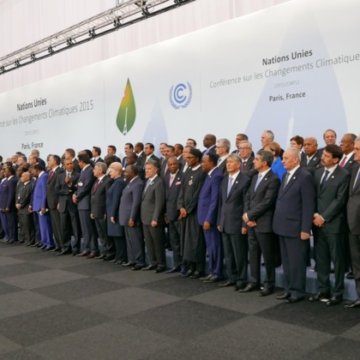- About
- Topics
- Picks
- Audio
- Story
- In-Depth
- Opinion
- News
- Donate
- Signup for our newsletterOur Editors' Best Picks.Send
Read, Debate: Engage.
| topic: | Climate action |
|---|---|
| located: | USA |
| editor: | Yair Oded |
Earlier this week, President Trump announced that his administration will begin the process of officially withdrawing from the Paris Agreement on climate change – an international treaty signed by nearly 200 countries in which they pledge to reduce the levels of CO2 emissions in the coming decade.
The president’s announcement was met with vociferous condemnation by world leaders, environmental activists, business owners, as well as his political rivals in the United States – who railed against the prospect of having the world’s largest economy and the second greatest emitter of greenhouse gases (after China) abandon its commitment to tackling the climate crisis.
A staunch supporter of the fossil fuel industry and a notorious denier of climate change, Trump has vowed to abandon the Paris Agreement on day one of his presidency. Ongoing efforts by numerous world leaders and diplomats to negotiate with the Trump Administration and keep the United States as a signatory have failed, and this week's announcement will mark the official onset of America’s withdrawal process.
Officially, Trump cannot exit the agreement until the day after the November 2020 elections, and so the outcome of the race will determine whether or not the U.S. would indeed withdraw.
Commenting on the administration’s decision to leave the agreement, Secretary of State Mike Pompeo iterated that abiding by the treaty's emission reduction standards would inflict enormous damage on the American economy. He further added that “[T]he U.S. approach incorporates the reality of the global energy mix and uses all energy sources and technologies cleanly and efficiently, including fossil fuels, nuclear energy, and renewable energy."
In reality, however, the United States’ stalling on climate action would not only magnify the human and financial cost it will have to bear due to climate-related disasters (currently estimated at hundreds of billions of dollars and hundreds of millions of people affected), but also cause the country to miss out on an opportunity to play a crucial role in transitioning the global economy to renewable energy.
Furthermore, the withdrawal of the U.S. from the agreement could potentially imperil the survival and efficacy of the entire treaty, as other countries could feel discouraged from upholding their commitments to reduce emissions. The EU has been trying to ensure that the agreement will stay intact even after the United States’ departure, but may face a backlash from countries like China and India, whose initial impetus for joining the treaty was America’s involvement.
While the emissions restrictions stipulated in the treaty are far from sufficient, the agreement nonetheless serves as an initial and crucial framework which brings together the world’s nations in an effort to jointly tackle the climate emergency and our planet’s ecological collapse. The consequences of the agreement's crumbling would be catastrophic for people across the globe, and primarily, at least at first, for vulnerable and oppressed communities, such as women and children and Indigenous peoples.
In a statement condemning Trump’s decision to withdraw from the agreement, Amnesty International Secretary General Kumi Naidoo said: “Selfish, reckless and monstrous, the continued attempt to pull the U.S. out of the Paris Agreement is potentially the most destructive act of the Trump presidency. President Trump may believe his commitment to fossil fuels will win him votes, but it will also cost lives. By putting his own personal agenda before the needs of the world’s population, he is willfully vandalizing global attempts to save humanity.”
In the days following the announcement, democratic presidential candidates emphasised their commitment to the Paris Agreement and vowed to join the treaty once again should they be elected.
Additionally, cities, states, and businesses across the U.S. pledged to continue to abide by the Paris Agreement standards and jointly work to reduce emissions despite the government’s destructive agenda. While commendable, such efforts could prove insufficient without governmental and legislative backing.
Even if a Democrat wins the 2020 race and commences the arduous bureaucratic process of re-entering the Paris Agreement, there is nothing to say that the U.S. won’t retrace its steps once an oil-loving Republican is back in the Oval Office.
America has lost the trust of the international community when it comes to its role as a leader in the fight to preserve our planet. This kind of trust will take decades to rebuild, and will require years of consistent, innovative, and unwavering climate action by the United States.
READ OUR DOSSIER ON CLIMATE CHANGE
Image: Heads of delegations at the 2015 UN Climate Change Conference (COP21), which led to the signing of the Paris Agreement. Nov. 30, 2015. Source: (Presidency of Mexico/Wikimedia Commons)

